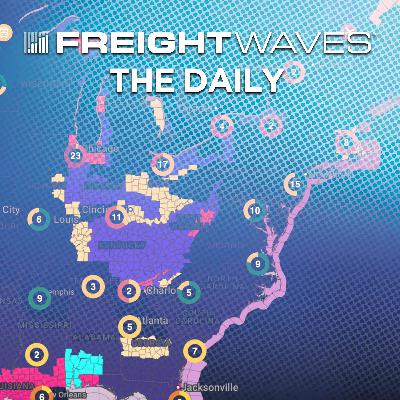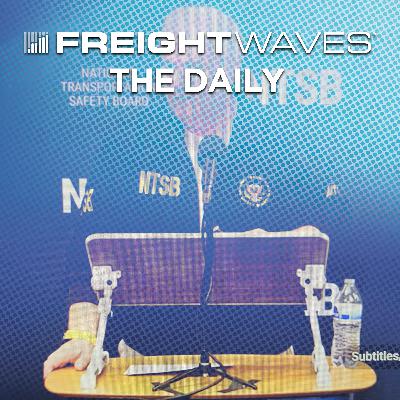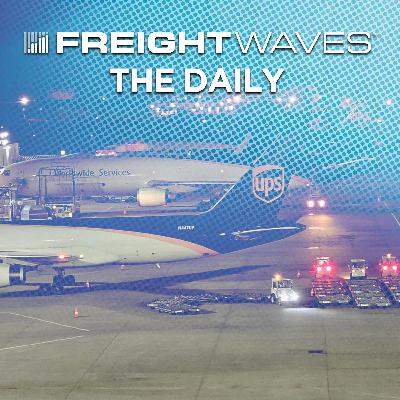Discover FreightWaves NOW
FreightWaves NOW

2043 Episodes
Reverse
We analyze why Ocean rates tested by capacity conundrum despite carriers attempting General Rate Increases and blanked sailings, indicating continued overcapacity and weak demand on the trans-Pacific trade lane. Simultaneously, we explore the quick response from air cargo providers, detailing how FedEx plugs transport hole caused by MD-11 groundings by activating spare aircraft and diverting packages to its domestic ground network.
We examine the state of port traffic, noting that Container imports off 17.6% at leading US port in October 2025, although the Port of Long Beach remains on pace to surpass its all-time annual cargo record from 2024. Turning to rail, we discuss Union Pacific's strategic moves as Union Pacific guarantees more post-merger union jobs, successfully securing the support of the National Conference of Firemen and Oilers (NCFO) and SMART-TD by committing to career-long employment for hundreds of members.
In the trucking sector, we analyze carrier strategy as Werner says ‘no retreat’ possible in dedicated fleet size, citing base capacity needs despite the ongoing severe downturn in the industry. Finally, we delve into the dramatic collapse of a highly anticipated venture, learning the story behind why “America’s Biggest Truck Stop” Falls Silent — Inside the Eviction of Trucker’s Paradise in Texas after months of financial disputes, investor issues, and allegations of unpaid wages.
Learn more about your ad choices. Visit megaphone.fm/adchoices
While the Port of Long Beach saw container volumes drop significantly—imports declined 17.6% and total TEUs fell 14.9% in October 2025 compared to the previous year's record-setting month—the hub remains ahead of its 2024 all-time annual cargo record pace through the first 10 months of 2025. Port officials are anticipating that American consumers will likely see price escalation on goods in the coming months as shippers are expected to pass along the costs of ongoing tariffs and trade policies.
In trucking, a major regulatory shift has been halted as the U.S. Court of Appeals for the D.C. Circuit temporarily stayed the FMCSA’s interim final rule heavily restricting non-domiciled commercial driver’s licenses. This administrative stay, ordered pending a review of a lawsuit filed by an affected driver, means state agencies can presumably resume issuing and renewing these non-domiciled CDLs.
Truckload carrier Werner Enterprises stated at an investor conference that it has hit a baseline capacity and sees "no retreat" from its current dedicated fleet size, despite calling the current downcycle the worst he has seen in 35 years in the industry. Werner's CEO asserted that the duration of the downturn and rising trucking accident rates across the industry may be linked to lower standards on CDL issuance and driver schools, which have contributed to excess capacity.
Learn more about your ad choices. Visit megaphone.fm/adchoices
Carrier sentiment is suppressed by a weak rate environment as the market waits for necessary fleet rationalization, highlighted by historic levels of Class 8 oversupply exceeding 90,000 units. The physical evidence of financial distress is staggering, demonstrated by the collapse in trailer prices—with 3-year-old 53-foot dry vans now trading for under $20,000—and the high volume of repossessions dominating used equipment sales, where 158 out of 162 units sold by Ritchie Bros. in Q3 2025 were repossessions.
This contraction is bleeding into the tech sector, as evidenced by the Chapter 11 filing of VC-backed freight tech startup Zuum, which listed assets and liabilities between $10 million and $50 million. Importantly, 19 of Zuum's top 20 unsecured creditors are freight brokers, revealing how interconnected the ecosystem is and exposing brokers to significant financial risk from failed tech platforms.
Amidst the contraction, the future driver talent pipeline is seeing massive investment, including a 4.9 million earmark secured by Senator Thom Tillis for Southeastern Community College in North Carolina to aggressively expand its truck driver training program. Furthermore, a significant bureaucratic roadblock was temporarily removed when the DC Court of Appeals issued a temporary stay on the FMCSA’s non-domiciled CDL rule, halting restrictions while the court reviews a lawsuit against the regulation.
We also cover major international policy shifts, including the U.S. Trade Representative suspending Section 301 port fees on China-built cargo ships for one year, a reciprocal move that temporarily eases global trade tensions. Finally, we discuss the sobering update in air cargo capacity, where the FAA temporarily grounded all MD-11 freighters for inspection following a tragic UPS crash in Louisville, impacting major carriers like UPS and FedEx globally.
Learn more about your ad choices. Visit megaphone.fm/adchoices
The growing list of bankruptcies in trucking has caught up a significant new participant from the freight tech part of the business, as VC-backed Zuum files for chapter 11 protection with assets and liabilities listed in the range of $10 million to $50 million.
The US Trade Representative officially announced the one-year suspension of port fees on Chinese ships docking at American ports. This suspension, effective until November 10, 2025, is part of a wide-ranging trade agreement where China simultaneously dropped retaliatory fees on U.S.-flagged vessels.
A legislative package designed to end the 40-day government shutdown includes a major earmark: $4.9 million for trucker training in North Carolina. Secured by Senator Thom Tillis, this appropriation for Southeastern Community College is seen as unusual because it is the ninth highest earmark among 360 others and dwarfs typical federal grants for truck driver training programs.
Plus, check out the FreightWaves TV lineup, including Loaded and Rolling with Thomas Wasson.
Learn more about your ad choices. Visit megaphone.fm/adchoices
Aifleet is cutting its fleet size from approximately 180 trucks down to about half and letting go of nearly 100 personnel, triggered by the abrupt termination of a contract with a key supplier.
The air cargo market is facing its own shock following a tragic crash, resulting in the temporary grounding of MD-11 freighters by both UPS (27 planes) and FedEx (28 planes) as a precautionary measure, following Boeing's recommendation. Since the MD-11 makes up about 9% of both companies' main fleets, this temporary loss of lift creates significant capacity tightness systemwide heading into peak season.
Simultaneously, U.S. tariff policies are forcing real, fundamental supply chain changes, with IKEA, for example, estimating over $400 million in additional tariff-related costs this year alone. This pressure is accelerating nearshoring efforts, with Mexico emerging as the strongest beneficiary, evidenced by investments like Motherson putting $50 million into a new auto parts plant and Kuehne+Nagel expanding its cross-border infrastructure in El Paso.
Looking overseas, the shift in sourcing is accelerating the decline in container import volumes, which are now projected to keep falling into early 2026, with December expected to be down almost 18% year-over-year. Meanwhile, the Suez Canal Authority, whose revenue plummeted 60% this year, is offering a 15% discount on tolls, hoping that stability returns and ships start coming back through the Red Sea in the new year. Finally, carriers must be cautious about immediate operational risks, as early blizzard conditions are severely hitting Chicago and the Midwest, causing major delays and poor visibility, especially around I-57.
Learn more about your ad choices. Visit megaphone.fm/adchoices
Aifleet is undergoing drastic cutbacks, reducing its fleet from about 180 trucks to a much smaller, undisclosed number, following the abrupt termination of a contract with a key supplier. CEO Marc El Khoury described these fleet reductions as "drastic," but necessary to allow the company a chance to survive in the freight recession, enabling them to pivot almost entirely away from the spot market and focus on a contracted freight model.
In air cargo news, UPS and FedEx halt MD-11 flying to conduct safety review after a fatal crash in Louisville last week, following a recommendation from manufacturer Boeing to conduct a safety review and engineering analysis. This grounding affects approximately 9% of their mainline fleets, with UPS operating 27 and FedEx operating 28 of the 70 MD-11 freighters currently in service, though both carriers are using contingency plans to mitigate disruption.
The logistics sector is also feeling the impact of capacity constraints caused by the long-running government shutdown, which led the FAA to order airlines in high-volume markets to reduce schedules by up to 10%. Businesses relying on passenger aircraft for domestic freight transport have the most exposure to these flight restrictions, while cargo-only airlines are collaborating with the FAA to adjust operations and minimize customer disruption.
Learn more about your ad choices. Visit megaphone.fm/adchoices
The FAA has mandated flight reductions—ramping up toward a 10% cut at 40 of the busiest domestic hubs due to air traffic controller shortages—which severely restricts domestic "belly cargo" capacity for high-value shipments but largely spares all-cargo carriers like FedEx and UPS.
The ground market is defined by a financial squeeze hitting 3PLs like RXO, who are struggling as locked-in, lower contractual sales rates are undercut by suddenly spiking buy rates for trucks, evidenced by the National Truckload Index climbing from $1.68 per mile to $1.80 more recently. RXO's CEO calls this structural capacity exit—driven by tighter regulations and spiking insurance costs forcing smaller carriers out—one of the largest structural changes since deregulation, prompting the company to execute $165 million in total cost cuts and rely heavily on technology to achieve a 19% boost in broker productivity.
We pivot to the ocean sector, where Maersk upgraded its full-year EBITDA guidance ($9.0-$9.5 billion) despite facing a jaw-dropping 30.7% year-over-year decline in Q3 freight rates, a success attributed to superior operational execution, 7% container volume growth, and an integrated network that provides a "better moat" against spot volatility. Finally, we track localized labor pressure, including over 900 supply chain layoffs in Texas across diverse sectors like crude oil transport, and monitor the rigorous, impartial review promised by Surface Transportation Board nominees for the massive proposed $85 billion Union Pacific/Norfolk Southern merger.
Learn more about your ad choices. Visit megaphone.fm/adchoices
A federal appeals court has reinstated Yellow Corp.'s $137 million lawsuit against the International Brotherhood of Teamsters, overturning a previous dismissal by a lower court. The former LTL carrier can now amend its complaint against the union, which it claims deliberately blocked the "Yellow One" restructuring plan necessary for the company’s survival.
The latest U.S. Bank Freight Payment Index shows a strong reversal in the freight market, with national shipment volumes falling 2.9% while shipper spending paradoxically increased 2% in the third quarter. This ongoing divergence, where shippers are paying more for moving less, suggests that carriers are continuing to exit the market, contributing to capacity constraints.
Additionally, new bipartisan legislation introduced in the Senate aims to broaden human trafficking bans as they apply to truck drivers and extend permanent restrictions to workers in the rail, maritime, and air sectors. This proposed bill, the TRAFFIC Act, would broaden the scope of disqualification by removing the requirement that the felony was committed using a commercial vehicle.
Learn more about your ad choices. Visit megaphone.fm/adchoices
We begin with the tragic UPS cargo jet crash near Worldport in Louisville, UPS's critical global hub, which resulted in at least nine confirmed fatalities and exposed the fragility of single-point logistics assets.
This immediate physical disruption led UPS to cancel initial express and deferred operations and suspend the money-back guarantee for all US packages, even as the NTSB worked quickly to recover the flight recorders. Following the accident, night sort operations at Worldport partially resumed to enable next-day air deliveries, though delivery commitments were relaxed for Thursday.
Wall Street severely reacted to 3PL RXO’s Q3 earnings report, sending the stock plummeting over 14% pre-market after the company reported adjusted net income of just $2 million compared to $7 million last year and missed analyst estimates on EPS. RXO’s CEO cited a "deadly combination" of rising truckload capacity costs alongside persistently weak demand, forcing the company to launch aggressive new cost initiatives targeting over $30 million in savings.
Broader market data confirms this complex landscape, revealing a persistent trucking paradox where Q3 national shipment volumes fell 2.9% but shipper spending paradoxically increased 2% quarter-over-quarter, suggesting that capacity is leaving the market faster than demand is declining. This divergence grants remaining carriers unexpected pricing power, while regional differences were severe, including a massive 15.7% volume drop in the Southwest amplified by stricter DOT English language proficiency rules.
Further underscoring the market weakness, recent CarrierSource data shows shipper search activity for trucking capacity fell to its lowest point in over a month, driven by macroeconomic uncertainty and production slowdowns. In response to this volatility, global terminal operator DP World is focusing on resilient supply chains by leveraging its vast network across 78 countries and strategically investing in technology, particularly AI and predictive tools.
DP World is offering adaptive solutions such as deploying "pop-up warehouses" for temporary surge capacity in locations like Olive Branch, Mississippi, and Miami, and strategically using alternative gateways like Prince Rupert and Vancouver for fast rail access into the US Midwest and Northeast. These strategies emphasize building options and flexibility into the network to navigate volatility, whether it stems from physical crashes or financial squeezes.
Learn more about your ad choices. Visit megaphone.fm/adchoices
The episode opens with the volatile reaction on Wall Street to 3PL RXO's third-quarter earnings, which saw the stock plummet over 14.8% in pre-market trading after the 6:30 a.m. The logistics provider reported performance that was largely stagnant year-over-year, including a decline in adjusted net income to $2 million and a GAAP net loss of 8 cents per share, prompting the CEO to emphasize strategic scale and cost initiatives for future profitability.
We also cover the ongoing disruption at UPS Worldport in Louisville following the deadly cargo jet crash that happened on Tuesday. Although night sorting operations resumed Wednesday evening to enable next-day air deliveries for Thursday, UPS has relaxed delivery commitments, extending some time-definite services by 90 minutes or 72 hours due to the continuing investigation and resulting runway closure.
National Transportation Safety Board investigators have successfully recovered both the cockpit voice recorder and the flight data recorder from the MD-11 freighter. Authorities have confirmed 12 fatalities from the incident, including the three crew members, as investigators work diligently to determine the probable cause and minimize slowdowns to the critical freight network, which moves life-saving drugs and postal products.
Learn more about your ad choices. Visit megaphone.fm/adchoices
The October Logistics Managers' Index data, detailed in the article October LMI shows price increases outpacing capacity growth, shows transportation utilization (57.3) and pricing (61.7) surged, reversing the prior negative freight inversion.
This tight market prediction is worsened by the immediate air cargo capacity shock stemming from the UPS MD-11 crash on November 5th, a tragedy covered in LATEST: Death toll in UPS cargo jet crash rises to 7. This incident led to seven confirmed fatalities and resulted in the indefinite closure of the Louisville Muhammad Ali International Airport and the complete halt of UPS Worldport operations.
Regulatory pressure is further squeezing the driver pool through the FMCSA’s new non-domiciled CDL rule, which prevents Ukrainian war refugees from renewing legally obtained licenses, a complex issue explored in CDL overhaul tailspins Ukrainian truckers. Meanwhile, labor friction is mounting as the Teamsters union accuses UPS of violating its contract by diverting delivery work to non-union gig drivers at subsidiaries like Roadie and Happy Returns, a conflict covered in Teamsters union to press UPS over Roadie use of gig drivers.
Shifting focus to corporate performance, Uber Freight revenue flat in Q3 as company posts strong delivery gains reports the freight unit's Q3 revenue remained flat at $1.31 billion and incurred a loss, even as Uber’s overall mobility and delivery divisions saw strong growth and record adjusted EBITDA. Conversely, TFI CEO Alain Bedard anticipates a weak fourth quarter, yet offers a strongly positive long-term outlook, particularly for 2026, due to operational improvements in LTL and potential infrastructure impacts, as detailed in TFI’s Bedard sees a stronger 2026 after a weak 4Q.
Learn more about your ad choices. Visit megaphone.fm/adchoices
Details emerge on the devastating UPS MD-11 freighter crash that occurred during takeoff from Louisville, Kentucky, while the widebody cargo jet was bound for Honolulu. The death toll has tragically risen to seven individuals, with 11 injuries reported, leading to the indefinite closure of the Louisville Muhammad Ali International Airport and the halt of package sorting operations at Worldport.
The Panama Canal Authority is moving full steam ahead with an $8.5 billion, 10-year modernization plan designed to maintain the canal's competitiveness as climate pressures and global trade patterns evolve. This strategy includes constructing two new container terminals, implementing a liquefied petroleum gas pipeline, and initiating the Río Indio reservoir project, all aimed at expanding capacity and reducing dependence on water-intensive operations.
Finally, we discuss the ongoing labor tensions between UPS and the Teamsters union regarding alleged contract violations, which is explored in Teamsters union to press UPS over Roadie use of gig drivers. Teamsters Local 804 claims that UPS is improperly diverting partial delivery work to its subsidiary, Roadie, which uses a technology platform to match freelance drivers to packages, thereby violating their 2023 collective bargaining agreement to avoid safety laws and overtime payments. UPS denies the accusation, maintaining that Roadie and Happy Returns operate distinct business models for specialized deliveries that do not mix with the main UPS parcel sortation network, though the Teamsters' national office is consolidating grievances for arbitration.
Learn more about your ad choices. Visit megaphone.fm/adchoices
For-hire trucking capacity is contracting significantly due to a 32% reduction in tractor builds (taking equipment below replacement levels) and stricter FMCSA English Language Proficiency enforcement, which could affect up to 10% of the driver pool.
Despite shrinking capacity, freight rates are only seeing marginal spot market improvements of 1-2%, failing to keep pace with 3% inflation, due to volume volatility and broader macroeconomic risks. Regulatory friction is also widespread, as a federal judge issued a preliminary injunction blocking the California Air Resources Board from enforcing its Clean Truck Partnership against major OEMs (like Daimler, PACCAR, and Volvo). This legal development was driven by the judge's conclusion that CARB's lawsuit was attempting to enforce potentially federally preempted standards, creating an "impossible situation" for manufacturers after federal waivers for rules like the Advanced Clean Truck rule were withdrawn.
In stark contrast to regulatory tangles, technology offers surprisingly frictionless solutions: fleets using complete AI safety solutions saw a 73% reduction in crash rates over 30 months, nearly double the industry average. Within just six months of implementation, these systems also achieved a 49% drop in harsh driving events and an 84% reduction in mobile phone use behind the wheel, alongside a 57% boost in Hours of Service compliance.
Serious, hyperfocused investment is flowing into specialized logistics globally, notably in air cargo where Cargojet launched a new direct weekly service connecting its Canadian hubs to Liege Airport in Belgium. Latam Cargo also boosted its Europe-South America capacity by 25% (reaching 15 weekly frequencies), adding specialized routes like São Paulo to Brussels with a stop in Recife to handle mango exports.
Domestically, TRAC Intermodal is focusing on standardization and efficiency by partnering with Florida East Coast Railway to stage standardized, GPS-integrated 53-ft domestic chassis directly at FEC terminals, aiming to build a national footprint for their T-53 program. Meanwhile, UPS completed its $1.6 billion acquisition of Andlauer Healthcare Group to strengthen its specialized Canadian cold chain and accelerate its strategic goal of doubling high-margin healthcare logistics revenue to $20 billion by 2026.
Learn more about your ad choices. Visit megaphone.fm/adchoices
A federal judge issued a preliminary injunction stopping the California Air Resources Board from enforcing the Clean Truck Partnership against truck manufacturers. This block occurred because a state court lawsuit filed by CARB seeking OEM compliance was viewed by the federal court as an attempt to enforce potentially preempted zero emissions standards, particularly since Congress withdrew the EPA waivers that allowed the Advanced Clean Truck rule to go into effect.
UPS has completed the acquisition of Canadian logistics provider Andlauer Healthcare Group for $1.6 billion in cash. Michael Andlauer, AHG's founder and CEO, will now lead UPS Canada Healthcare and AHG, significantly bolstering UPS’s specialized cold chain network and strategic focus on the high-margin healthcare sector.
Learn how AI is reshaping fleet operations with the release of Samsara’s Safety Report: Benchmarking the Future of Safety. The report reveals that fleets implementing complete AI safety solutions saw a 73% reduction in crash rates over 30 months, with visibility and immediacy provided by dual-facing dash cams being identified as the biggest difference-maker.
Don't miss today's FreightWaves TV lineup, including an episode of Loaded and Rolling with Thomas Wasson and Check Call with Mary O'Connell. You can always find your favorite FreightWaves shows on the FreightWaves YouTube channel if you miss the live broadcast.
Learn more about your ad choices. Visit megaphone.fm/adchoices
Learn more about your ad choices. Visit megaphone.fm/adchoices
Learn more about your ad choices. Visit megaphone.fm/adchoices
The Department of Transportation is escalating its battle against "CDL mills" accused of certifying unqualified drivers, promising to eliminate unsafe operators and investigate fleets that hire them. This heightened regulatory enforcement is already leading to a significant capacity shakeout in the truckload market, which could potentially overshadow Schneider’s tough Q3 earnings report.
DOT Secretary Sean Duffy is expanding driver enforcement to shippers who load up rigs, warning that companies must ensure truck drivers meet federal English language proficiency rules or face substantial penalties. This focus on language compliance follows the sidelining of more than 7,000 truckers reportedly for English proficiency violations due to a revived out-of-service criterion this year.
Meanwhile, UPS announced that 2,000 drivers left UPS after taking buyouts in the third quarter, part of a major streamlining campaign that has eliminated 48,000 jobs over the past 18 months. Across the industry, TFI International reported mixed signs of a turnaround at TFI’s U.S. LTL operations, showing flat year-over-year operating ratios and decreased operating income across all major segments.
Learn more about your ad choices. Visit megaphone.fm/adchoices
Transportation Secretary Shawn Duffy announced a major new initiative this week, ramping up efforts to crack down on fraudulent CDL mills and unsafe drivers after increased roadside inspections led to over 7,000 service violations. The Department of Transportation is now focusing on the integrity of the certification process and plans to investigate both driver training programs and trucking companies that hire drivers with questionable credentials, holding them accountable for safety standards.
LTL carrier XPO continues to defy the soft market cycle, reporting significant margin improvement in its LTL segment during the third quarter. The company achieved an 82.7% operating ratio for the quarter by leveraging a variety of pricing levers and implementing AI optimization initiatives.
Parcel analyst Satish Jindel estimates that approximately 2,000 unionized delivery drivers accepted a voluntary separation package offered by UPS during the third quarter. These buyouts, which cost the company $175 million and offered severance packages of $1,800 per year of service, were part of a major streamlining campaign intended to align capacity with lower volumes.
Learn more about your ad choices. Visit megaphone.fm/adchoices
The Great Freight Recession continues its relentless purge in the carrier sector, claiming Illinois-based VIB Trans, a 29-truck carrier, as the latest casualty to file for Chapter 11 amid deeply depressed spot rates and relentlessly high operating costs. This pain is accelerating due to an 18% drop in freight volumes coupled with immense overcapacity, driven by 310,000 new trucks and 200,000 new CDLs added to the system since 2019.
Strategic experts are anticipating the Largest capacity purge in history coming as new regulations tighten enforcement around non-domiciled CDLs and ELP requirements. This regulatory squeeze could eliminate up to 600,000 active drivers from the system, potentially leading to sharp volatility spikes and market rationalization that ultimately benefits surviving carriers with higher pay and increased freight rates.
While carriers fight for survival, the brokerage world is thriving, C.H. Robinson again is strong, and Wall Street throws roses after the company posted extremely strong third-quarter performance, including a 22.6% increase in income from operations. C.H. Robinson’s core North American Surface Transport segment successfully grew combined truckload and LTL volume by 3%, demonstrating significant market share growth against a declining industry benchmark.
In strategic updates, UPS is reversing its costly insourcing strategy for low-budget shipments, tentatively agreeing to UPS, Postal Service to reunite for delivery of low-budget shipments via the USPS last-mile network. This reversal acknowledges that UPS's internal cost structure struggled to compete, especially after Ground Saver volume plummeted nearly 33% year-over-year.
Internationally, the U.S. and China suspended punitive reciprocal fees on docking ships for one year amid trade talks, which were originally imposed to revive U.S. shipbuilding. Plus, we cover immediate executive changes at CSX as CEO Steve Angel switches up leadership, naming Kevin Boone CFO and promoting Mary Clare Kenny to Chief Commercial Officer.
Learn more about your ad choices. Visit megaphone.fm/adchoices
VIB Trans, an Illinois-based carrier with 29 trucks, has filed for Chapter 11 bankruptcy amidst the long-running "Great Freight Recession" .
Brokerage giant C.H. Robinson showed robust profitability for the third quarter, which sent its shares soaring 20% right after the earnings release . The company saw income from operations jump 22.6% and adjusted gross profit for its core North American Surface Transport segment rise 5.6% year-over-year .
We examine the tentative agreement reached between UPS and the U.S. Postal Service to resume last-mile parcel delivery for UPS’s low-cost Ground Saver shipping service . This strategic move is part of a multi-pronged effort at UPS to reduce costs, patching up a relationship that had previously dissolved in 2024 over rate hikes on the final mile component .
Stick around for more content later today, including a new episode of The Long Haul featuring Tyler Harden of TTN Solutions and Natasha Sanders of Amazon Freight Partner. Plus, listen to Freightonomics, where Henry Byers and Jared Flinn join the conversation to discuss what's currently happening in the freight market.
Learn more about your ad choices. Visit megaphone.fm/adchoices













